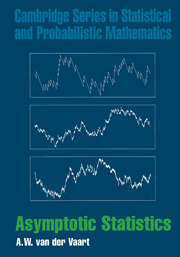Book contents
- Frontmatter
- Dedication
- Contents
- Preface
- Notation
- 1 Introduction
- 2 Stochastic Convergence
- 3 Delta Method
- 4 Moment Estimators
- 5 M–and Z-Estimators
- 6 Contiguity
- 7 Local Asymptotic Normality
- 8 Efficiency of Estimators
- 9 Limits of Experiments
- 10 Bayes Procedures
- 11 Projections
- 12 U -Statistics
- 13 Rank, Sign, and Permutation Statistics
- 14 Relative Efficiency of Tests
- 15 Efficiency of Tests
- 16 Likelihood Ratio Tests
- 17 Chi-Square Tests
- 18 Stochastic Convergence in Metric Spaces
- 19 Empirical Processes
- 20 Functional Delta Method
- 21 Quantiles and Order Statistics
- 22 L-Statistics
- 23 Bootstrap
- 24 Nonparametric Density Estimation
- 25 Semiparametric Models
- References
- Index
6 - Contiguity
Published online by Cambridge University Press: 05 June 2012
- Frontmatter
- Dedication
- Contents
- Preface
- Notation
- 1 Introduction
- 2 Stochastic Convergence
- 3 Delta Method
- 4 Moment Estimators
- 5 M–and Z-Estimators
- 6 Contiguity
- 7 Local Asymptotic Normality
- 8 Efficiency of Estimators
- 9 Limits of Experiments
- 10 Bayes Procedures
- 11 Projections
- 12 U -Statistics
- 13 Rank, Sign, and Permutation Statistics
- 14 Relative Efficiency of Tests
- 15 Efficiency of Tests
- 16 Likelihood Ratio Tests
- 17 Chi-Square Tests
- 18 Stochastic Convergence in Metric Spaces
- 19 Empirical Processes
- 20 Functional Delta Method
- 21 Quantiles and Order Statistics
- 22 L-Statistics
- 23 Bootstrap
- 24 Nonparametric Density Estimation
- 25 Semiparametric Models
- References
- Index
Summary
“Contiguity” is another name for “asymptotic absolute continuity.” Contiguity arguments are a technique to obtain the limit distribution of a sequence of statistics under underlying laws Qn from a limiting distribution under laws Pn Typically, the laws Pn describe a null distribution under investigation, and the laws Qn correspond to an alternative hypothesis.
Likelihood Ratios
Let P and be measures on a measurable space. Then is absolutely continuous with respectto P if impliesfor every measurable set A; this is denoted by P. Furthermore, P and are orthogonal ifcan be partitioned as pwith and. Thus P “charges” only and lives on” the set which is disjoint with the “support” of P. Orthogonality is denoted by
In general, two measures P and need be neither absolutely continuous nor orthogonal. The relationship between their supports can best be described in terms of densities. Suppose P andpossess densities p and with respect to a measure and consider the sets
See Figure 6.1. Because, the measure P is supported on the set Similarly, is supported on The intersection receives positive measure from both P and provided its measure under is positive. The measure can be written as the sum of the measures. (6.1) As proved in the next lemma, P and Furthermore, for every measurable set A
The decomposition is called the Lebesgue decomposition of with respect to P. The measures and are called the absolutely continuous part and the orthogonal part (or singular part) of with respect to P, respectively. In view of the preceding display, the function is a density of with respect to P.
Information
- Type
- Chapter
- Information
- Asymptotic Statistics , pp. 85 - 91Publisher: Cambridge University PressPrint publication year: 1998
